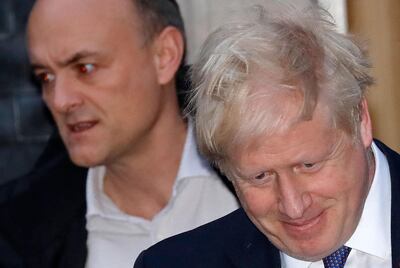Britain’s ruling Conservative Party is braced for the “next explosive revelation” from the government's former top advisor after the Prime Minister was forced to deny he was ready to see bodies "pile up" in the pandemic.
Further allegations from Dominic Cummings, the ex-chief of staff, could be hugely damaging to Boris Johnson’s reputation, particularly if there is evidence that contradicts the denials.
Asked whether he had made a remark about choosing between a high death toll and a lockdown last year, Mr Johnson dismissed the accusation: "No, but again, I think the important thing, I think, that people want us to get on and do as a government is to make sure that the lockdowns work, and they have," he said.
Mr Cummings made his charges in a blog post, provoking deep concerns within the governing party that the negative stories will allow the Labour opposition’s accusations of sleaze to resonate with the wider public.
Whitehall insiders fear another barrage of revelations on May 26 when Mr Cummings, 49, appears before a House of Commons select committee.
"We believe that Dom’s got loads more explosive revelations and he’s going to deploy his big guns when he goes before that committee,” said a Westminster source. “This is potentially going to get very nasty for Boris Johnson.”
The political establishment is holding its breath to see what else Mr Cummings might produce from his trove of saved WhatsApp messages with Mr Johnson or alleged recordings he is said to have made.
While one serious allegation would prove problematic but containable, there are now several that Downing Street is having to firefight.
The most recent is that Mr Cummings has documents proving the Prime Minister was prepared to let people die rather than impose a second lockdown last October.
Another is that Mr Johnson interfered in an inquiry into the leaked announcement of that second lockdown, suggesting it should be halted as it pointed to a friend of his fiancée Carrie Symonds. Downing Street has denied that claim too, as has the journalist who first broke the story based on inside sources.
Then there is a potential investigation over the costly refurbishment of Mr Johnson’s private flat in Downing Street that was allegedly paid for by a Tory donor but that Number 10 says came out of the Prime Minister’s pocket.
Finally, it has been disclosed that a senior Downing Street advisor apparently suggested that the government would not oppose the disastrous European Super League proposal, only to mount a quick about-turn when the public outcry became apparent last week.
The view in Westminster is that the stakes were raised significantly after Mr Johnson became incensed following the disclosure of his WhatsApp messages to entrepreneur James Dyson allegedly asking for tax allowances over the building of ventilators during the pandemic.
“Boris decided to go to war with Dominic Cummings and no one could persuade him that this was foolish idea,” said a Whitehall source. “He was told that in the end there's only one person that's got a reputation to protect … himself.”
Mr Cummings, who faced public outrage after driving to a beauty spot with his family in the middle of the first lockdown, has also detailed some allegations on his blog.
There is now growing speculation that more will emerge and might become highly personal, focusing on Mr Johnson’s relationship with his fiancée.
Gavin Barwell, chief of staff to former prime minister Theresa May, believes that the decision to brief to the press that Mr Cummings was responsible for the leaks “was a self-inflicted wound” and that Mr Johson perhaps regretted the decision to hire the former boss of the "Vote Leave" Brexit campaign as his top advisor.
He suggested there were concerns that Mr Cummings could land a killer blow. “You never know when you reach a tipping point,” Lord Barwell told the BBC. “And I suspect some people in Number 10 will be worried about what else that might be to come.”
The series of harmful stories have emerged at a time when Mr Johnson has been buoyed by the success of Britain’s vaccination programme.
It had also appeared that the infantile back-stabbing of last year, that hopefully ended when Mr Cummings left government in November, had resulted in a more stable, mature government.
But, for now at least, the ghosts of the past are casting a grim light on Mr Johnson’s premiership, raising questions over this judgement in first hiring Mr Cummings and then last week’s ill-chosen decision to allegedly brief against him.
"Never go to war with a newspaper" is a lodestar for many wily politicians. In this case, the axiom should read "never pick a fight with your former political advisor." As Mr Johnson and the rest of the country may soon discover, that is a person who knows too much.











